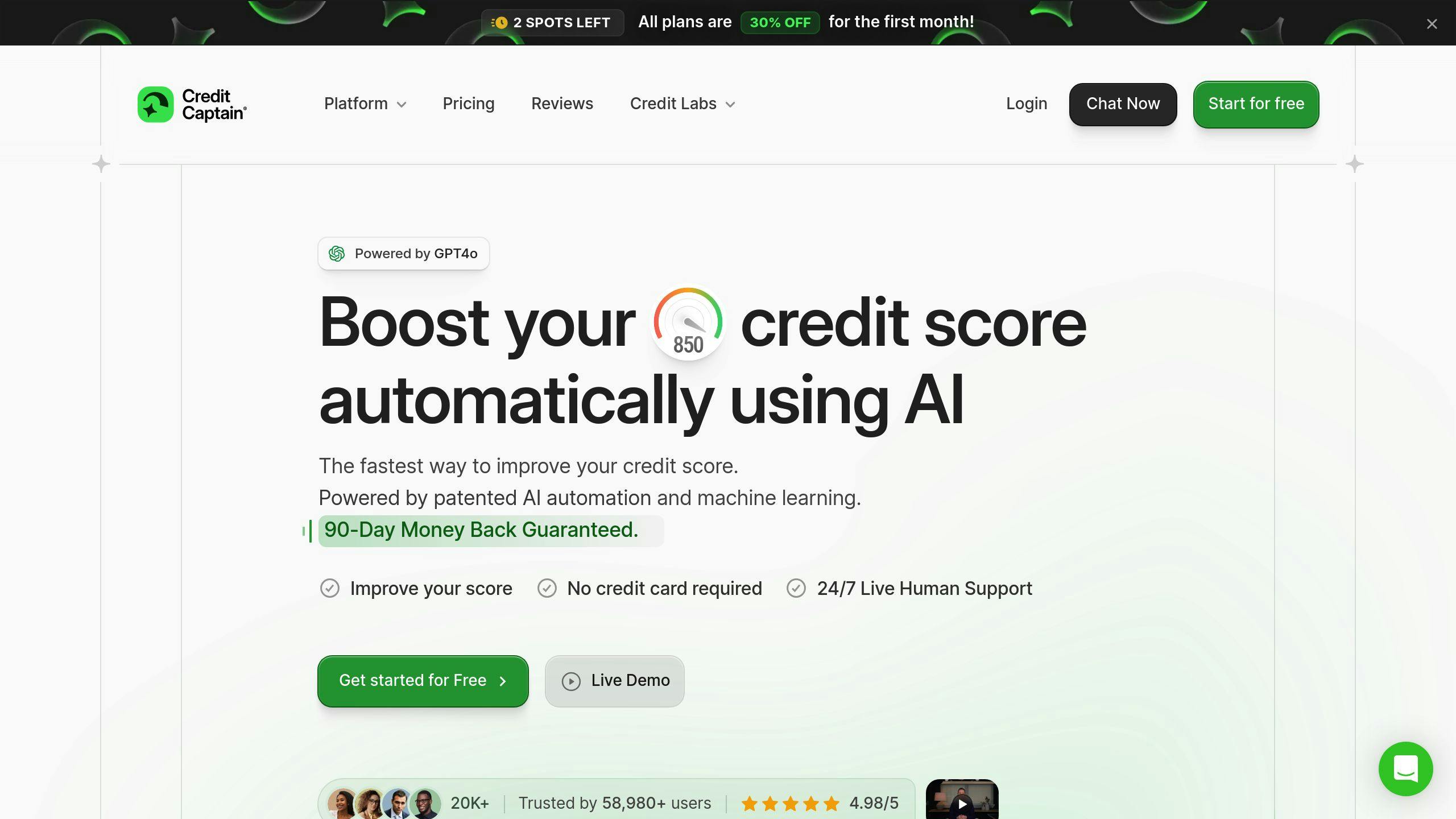Table of contents
- Quick Comparison
- How AI Credit Card Recommendation Tools Function
- Cred.AI Credit Card Review: Is It The Best Credit Card For Beginners?
- Leading AI-Powered Credit Card Recommendation Platforms
- Getting the Most from AI Credit Card Recommendations
- Challenges and Considerations of AI Credit Card Recommendations
- Conclusion: Using AI for Better Credit Card Choices

AI credit card recommendation tools simplify finding the right card for your financial needs. They analyze your spending habits, credit score, and goals to suggest tailored options. Here's what you need to know:
- Why Use AI? AI saves time by processing large datasets and offering personalized credit card matches. Tools like Kudos and CreditCaptain focus on rewards, credit-building, or specific features.
- How It Works: These platforms analyze financial data like income, payment history, and spending patterns using machine learning to provide accurate suggestions.
- Top Platforms: GigaPoints maximizes rewards, CheQ Wisor provides real-time credit insights, and CreditCaptain focuses on improving credit scores with AI-powered tools.
- Key Considerations: Always provide accurate data, evaluate AI recommendations carefully, and combine them with your personal financial knowledge for the best results.
Quick Comparison
| Platform | Key Features | Best For | Cost |
|---|---|---|---|
| GigaPoints | Spending analysis, rewards focus | Maximizing rewards | Free |
| CheQ Wisor | Real-time credit insights | Optimizing credit usage | Free |
| CreditCaptain | AI credit improvement tools | Building credit scores | $149–$299/month |
AI tools make credit card selection easier, but always balance their insights with your own financial goals.
How AI Credit Card Recommendation Tools Function
Data Collection and Analysis
AI credit card recommendation systems work by processing large volumes of financial data to build detailed user profiles. These systems don’t just rely on traditional metrics like credit scores - they also consider alternative data to better understand a user's financial habits.
For example, these tools can quickly scan through data points like spending patterns, payment histories, and even utility bill payments to assess creditworthiness. SoFi's AI system takes this a step further by analyzing factors like educational background, insurance claims, and mobile phone usage to fine-tune its recommendations [2]. Once all this data is gathered, machine learning models step in to identify trends and generate tailored suggestions.
Machine Learning Algorithms at Work
Machine learning is key to these systems, uncovering patterns that human analysts might overlook. These algorithms continuously adapt to new data, improving their accuracy over time.
"Machine learning has a strong potential to create a more accessible lending environment for consumers while helping banks maintain ultra-low NPL targets and high operating efficiencies." - Svitla Systems [2]
Visa's AI system is a great example. It uses machine learning to predict transaction outcomes, ensuring smoother and more efficient user experiences [3]. By analyzing specific criteria, these algorithms can craft recommendations that align closely with individual needs.
Criteria for Personalized Recommendations
AI systems consider a variety of factors when generating credit card recommendations:
| Criteria Category | Data Points Analyzed |
|---|---|
| Financial Data | Credit score, income, existing debt, credit utilization, payment history |
| Usage Patterns | Spending categories, payment consistency |
| Personal Preferences | Reward preferences, travel habits |
Platforms like Discover and Credit Sesame leverage AI to offer recommendations that match user preferences while also providing tools to help build credit [3][4]. Some systems, such as CreditCaptain, go even further by using patented AI technology to recommend credit cards and promise credit score improvements through detailed analysis and optimization [1][3].
Cred.AI Credit Card Review: Is It The Best Credit Card For Beginners?

Leading AI-Powered Credit Card Recommendation Platforms
Picking the right AI-powered platform can make a big difference when it comes to smarter credit card choices.
CreditCaptain

CreditCaptain is designed to help users boost their credit scores, making it easier to qualify for better credit cards. Using patented AI technology, it automates credit score improvements and tailors card recommendations to individual needs. The platform offers three subscription plans: Basic ($149/month), Pro ($199/month), and Turbo ($299/month). Features include AI-powered credit dispute tools, dedicated account management, and pre-approved financing options. Plus, it comes with a 90-day money-back guarantee for added peace of mind.
Feature and Benefit Comparison
AI-powered credit card platforms come with various tools to help users make informed financial choices. Here's a comparison of some top options:
| Platform | Key Features | Unique Benefits | Best For |
|---|---|---|---|
| GigaPoints | AI-driven spending analysis, large card database | Maximizing rewards | Users focused on rewards |
| CheQ Wisor | Real-time credit insights, tailored advice | Optimizing credit usage | Those needing detailed guidance |
| CreditCaptain | AI credit improvement, automated disputes | Guaranteed credit score growth | People building their credit |
Each platform targets different financial needs. GigaPoints is perfect for maximizing rewards across spending categories, while CheQ Wisor offers in-depth credit usage insights. CreditCaptain, on the other hand, is ideal for those focused on improving their credit scores over time.
When deciding, think about your main goal - whether it’s finding the best card for rewards, getting personalized advice, or improving your credit. The right choice will depend on your financial priorities and current credit situation.
sbb-itb-b2789ac
Getting the Most from AI Credit Card Recommendations
To get the best results from AI-powered credit card tools, it's important to know how to use them effectively.
Provide Accurate and Complete Data
For AI to give you personalized credit card suggestions, you need to share precise financial details. This includes your income, expenses, credit score, and financial goals. If the data you provide is incomplete or incorrect, the recommendations might not be as useful as they could be.
Interpreting AI Recommendations
Knowing how to evaluate AI-generated suggestions is key to making smart choices. When reviewing credit card options, keep these factors in mind:
| Aspect | What to Consider | Why It Matters |
|---|---|---|
| Key Financial Terms | Compare rates, limits, and fees | Impacts long-term costs and benefits |
| Reward Programs | Look at point systems and cashback | Helps match your spending habits |
| Annual Fees | Weigh cost against benefits | Affects the overall value of the card |
Combining AI Suggestions with Personal Insight
AI tools can offer great insights, but they work best when paired with your own financial knowledge. Here’s how you can make the most of them:
- Mix AI recommendations with your own research, keeping your lifestyle and financial goals in mind.
- Periodically assess whether the AI-recommended cards are still meeting your needs and adjust as necessary.
"Managing credit can often feel overwhelming, with multiple cards, intricate reward programs, and a constantly evolving financial landscape. CheQ Wisor is our answer to simplifying this challenge." - Aditya Soni, Founder & CEO of CheQ [6]
While AI is a valuable tool, being aware of its limitations ensures you make the smartest financial choices.
Challenges and Considerations of AI Credit Card Recommendations
Privacy and Data Security
AI-powered tools for credit card recommendations rely on access to sensitive financial data. Keeping this data secure is crucial. Here are some ways to safeguard your information:
| Security Measure | Implementation | Benefit |
|---|---|---|
| Data Encryption | Use platforms that adopt encryption standards used by banks | Protects your financial data from breaches |
| Authentication | Enable two-factor authentication (2FA) | Adds an extra layer of security |
| Privacy Controls | Adjust data-sharing settings | Helps you stay in control of your information |
While security measures protect your data, the quality of AI recommendations depends on how well the system is designed and updated.
Accuracy and Bias in Recommendations
The reliability of AI recommendations is tied to the quality and variety of its training data, along with regular updates to reflect market changes. Factors influencing accuracy include:
- Quality and diversity of training data
- Frequent updates to align with evolving market conditions
- Unique personal circumstances that may not fit standard algorithms
"The new offering uses GigaPoints' proprietary AI and our extensive database of credit card systems to show you the best card in each category" - Erik Budde [4]
Even with advanced systems, human input is critical to ensure the recommendations align with individual financial goals.
The Role of Human Oversight
AI tools are a great starting point, but they shouldn't replace human judgment when choosing a credit card. Here's how AI and human insight can complement each other:
| Aspect | AI Capability | Human Input Needed |
|---|---|---|
| Financial Goals | Analyzes spending patterns | Considers long-term plans and life changes |
| Market Context | Matches preferences with offers | Evaluates emotional factors and brand loyalty |
Platforms like CreditCaptain combine AI-driven insights with human expertise to offer a more balanced approach [5]. This mix ensures the technology is paired with practical financial know-how.
To get the most out of AI credit card recommendations:
- Check the platform's security features
- Compare recommendations across different sources
- Balance AI insights with your personal financial knowledge
Staying proactive by regularly reviewing and updating your choices ensures the recommendations remain aligned with your financial needs.
Conclusion: Using AI for Better Credit Card Choices
AI tools offer a powerful way to make informed credit card decisions, even with challenges like data security and potential biases. These tools process large amounts of information to provide tailored suggestions, helping users manage costs, maximize rewards, and consider credit impact.
| Aspect | AI-Driven Benefits | User Impact |
|---|---|---|
| Decision Making | Data-based recommendations | Easier, less stressful choices |
| Cost Management | Analysis of fees and interest | Reduced financial burden |
| Reward Matching | Customized reward suggestions | Better card perks |
| Credit Awareness | Credit score considerations | Improved chances of approval |
To get the most out of these tools, keep these strategies in mind:
- Provide accurate financial details for better recommendations.
- Use platforms that prioritize strong security protocols.
- Review all factors - fees, rewards, and interest rates - before making a choice.
While AI offers valuable insights, combining its recommendations with your personal financial knowledge will lead to the best results. As AI continues to improve, it will play an even bigger role in helping people make smarter financial decisions.



